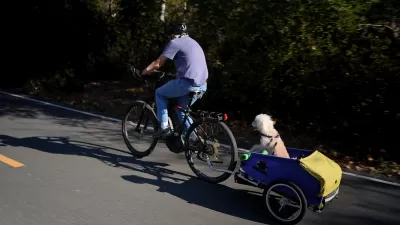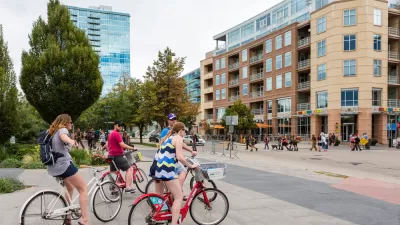The city could join others in offering rebates on e-bikes to get more people out of their cars and reduce traffic and carbon emissions.

With e-bike rebate programs proving extremely popular in other cities, Atlanta could be the next to offer rebates to residents who purchase e-bikes, reports Meris Lutz for the Atlanta Journal-Constitution.
Making e-bikes more accessible can help Atlanta residents lower their carbon footprints, spend more time outdoors, and more easily replace short car trips. According to Lutz, “Georgia law treats e-bikes as regular bicycles that do not require licensing or registration as long as the motor is less than 750 watts and the speed tops out at 20 miles per hour.”
Councilman Matt Westmoreland, who sponsored legislation to create an e-bike subsidy study committee, hopes to enact a program by Earth Day on April 22. Although the details have yet to be hammered out, he envisions about a $1 million program to start, possibly with federal money, with larger rebates for income-qualifying residents.
The article outlines the city’s recent failures to meet its goals when it comes to bike infrastructure, which impacts how residents feel about biking on the city’s streets. But recent changes in city government, as well as a $750 million infrastructure approved by voters that includes funding for protected bike lanes, could bode well for Atlanta’s bike infrastructure.
FULL STORY: Atlanta eyes subsidizing e-bikes as popularity surges

Alabama: Trump Terminates Settlements for Black Communities Harmed By Raw Sewage
Trump deemed the landmark civil rights agreement “illegal DEI and environmental justice policy.”

Planetizen Federal Action Tracker
A weekly monitor of how Trump’s orders and actions are impacting planners and planning in America.

The 120 Year Old Tiny Home Villages That Sheltered San Francisco’s Earthquake Refugees
More than a century ago, San Francisco mobilized to house thousands of residents displaced by the 1906 earthquake. Could their strategy offer a model for the present?

In Both Crashes and Crime, Public Transportation is Far Safer than Driving
Contrary to popular assumptions, public transportation has far lower crash and crime rates than automobile travel. For safer communities, improve and encourage transit travel.

Report: Zoning Reforms Should Complement Nashville’s Ambitious Transit Plan
Without reform, restrictive zoning codes will limit the impact of the city’s planned transit expansion and could exclude some of the residents who depend on transit the most.

Judge Orders Release of Frozen IRA, IIJA Funding
The decision is a victory for environmental groups who charged that freezing funds for critical infrastructure and disaster response programs caused “real and irreparable harm” to communities.
Urban Design for Planners 1: Software Tools
This six-course series explores essential urban design concepts using open source software and equips planners with the tools they need to participate fully in the urban design process.
Planning for Universal Design
Learn the tools for implementing Universal Design in planning regulations.
Clanton & Associates, Inc.
Jessamine County Fiscal Court
Institute for Housing and Urban Development Studies (IHS)
City of Grandview
Harvard GSD Executive Education
Toledo-Lucas County Plan Commissions
Salt Lake City
NYU Wagner Graduate School of Public Service





























